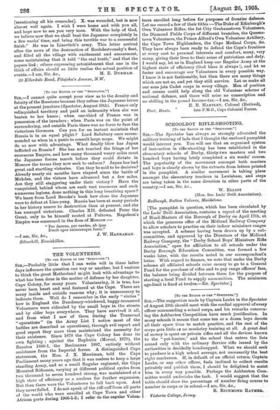Sin,—Probably little that I can write will in these latter
days influence the question one way or another, but I venture to think the great Motherland might look with advantage to what has been done in the matter of defence by her daughter, Cape Colony, for many years. Volunteering, it is true, has never been heart and soul fostered at the Cape. There are many inside and outside reasons why; it is unnecessary to indicate them. Well do I remember in the early " sixties " how in England the Dundreary-whiskered, baggy-trousered Volunteers were ridiculed by the small boys in the streets and by older boys everywhere. They have survived it all, and from what I saw of them during the Transvaal " operations " (in the Army List I notice most of the battles are described as operations), through evil report and good report they more than maintained the necessity for their existence. Since 1878 the Cape Colony has done its own fighting ; against the Baphutis (Morosl, 1879), the Basutos 1880-1, the Bechuanas 1897, entirely without assistance from the Imperial forces. A distinguished Cape statesman, the Hon. J. X. Merriman, told the Cape Parliament many years ago that it was useless to keep a large standing Army, and so a small Regular regiment, the Cape Mounted Riflemen, varying at different political cycles from two thousand to seven hundred strong, was maintained at a high state of efficiency as a nucleus for further expansion. But then there were the Volunteers to fall back upon. And they never failed. I do not speak of the riff-raff from all parts of the world who were enrolled at Cape Town and other African ports during 1900-1-2; I refer to the regular Volun- teers enrolled long before for purposes of frontier 'ddence. Let me record a few of their titles :—The Duke of Edinburgh's Own Volunteer Rifles, the 1st City Grahamstown Volunteers, the Diamond Fields Corps of different branches, the Queens- town Volunteers, the Prince Alfred's Own Volunteer Artillery, the Cape Town Highlanders, the Cape Medical Corps, &e. They have always been ready to defend the Cape's frontiers at every cost to personal interests and comfort, many, very many, giving their lives to their sense of patriotism and duty. I would say, let us in England keep our Regular Army at the highest state of efficiency (God bless it always !), and let us foster and encourage our Volunteers in every possible way. I know it is not fashionable, but then there are many things which are not so, and yet they still survive. Let us make all our sons join Cadet corps in every village. Men of position and means could help along the old Volunteer scheme of national defence, and there will arise no conscription an no shilling in the pound Income-tax.---I am, Sir, &c.,
E. B. HARTLEY, Colonel (Retired),
Fleet, Hants. late P.11.0., Cape Colonial Forces.


































 Previous page
Previous page